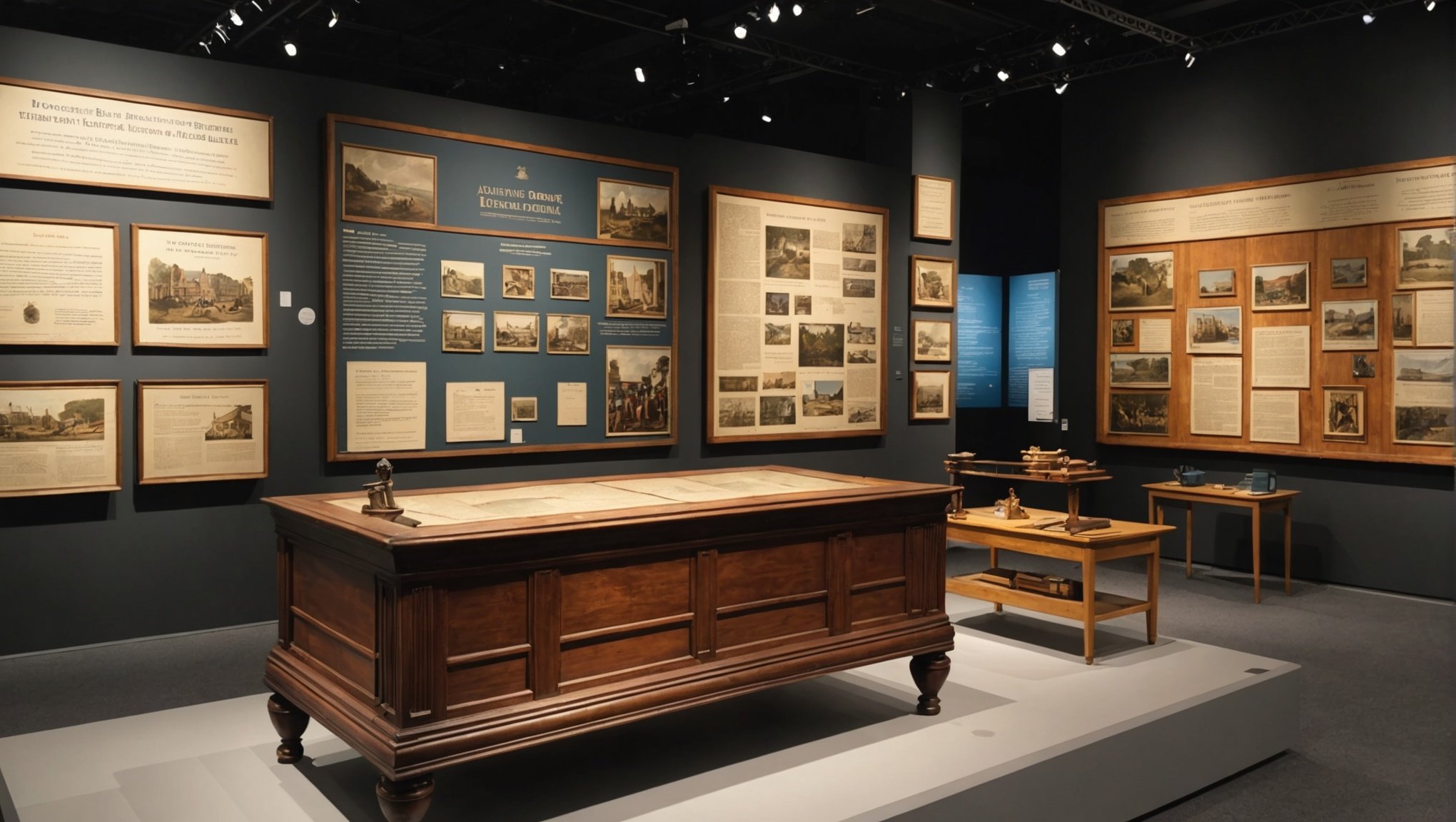British colonial history is often complex and multifaceted, presenting both achievements and atrocities. Engaging with interactive exhibits can revive forgotten narratives and offer fresh perspectives on this tumultuous past. These experiences allow visitors to connect emotionally with history, fostering empathy and understanding. Explore how museums use innovative technology and storytelling to make learning immersive and impactful. Discover the power of these exhibits in reshaping our perceptions and encouraging informed discussions about legacy and identity.
Overview of British Colonial History
The British colonial history is marked by a series of expansions, beginning in the late 16th century. This era saw England, later known as Great Britain, establishing its first colonies in North America and the Caribbean. By the 18th century, British colonial expansion had spread to parts of Africa, Asia, and the Pacific.
Topic to read : Experience the splendor of art: visit borghese gallery today
Key Events and Figures
Several pivotal events and figures shaped this period. The establishment of the East India Company in 1600 played a crucial role in British dominance in India. The Battle of Plassey in 1757 marked a significant victory, leading to British control over Bengal. Figures like Robert Clive and Warren Hastings were instrumental in these developments.
Impact of Colonialism
The impact of colonialism was profound, both for the colonised regions and Britain itself. Economically, it facilitated the flow of wealth and resources to Britain, fuelling the Industrial Revolution. However, it also led to the exploitation of local populations and resources. Culturally, colonial rule imposed British systems of governance, education, and societal structures, often eroding indigenous traditions and languages. The legacy of British colonialism is complex, leaving lasting effects on former colonies' political and social landscapes.
Topic to read : Plan your visit: smart tips for roman forum tickets
Interactive Exhibits Highlighting Colonial History
Interactive exhibits in museums worldwide offer engaging experiences that bring British colonial history to life. These exhibits often employ technology and hands-on activities to enhance learning and visitor engagement. For instance, the British Museum in London features digital touchscreens that allow visitors to explore colonial artefacts in detail, offering an immersive educational experience.
Notable interactive exhibits include virtual reality tours, where visitors can step back in time and witness historical events like the Battle of Plassey. These technologies provide a vivid representation of history, making it more relatable and memorable. Museums also use augmented reality apps, enabling visitors to interact with exhibits via their smartphones, enriching their understanding of colonial history.
Visitor engagement strategies focus on creating a participatory environment. Exhibitions often incorporate storytelling elements, guiding visitors through narratives of colonial figures and events. Interactive workshops and guided tours further involve visitors, encouraging them to explore and discuss the complex legacy of colonialism.
These engaging experiences not only educate but also foster a deeper connection with history, allowing visitors to critically reflect on the profound impacts of British colonialism.
Notable Museums and Their Offerings
Exploring British colonial history through museums offers insightful educational experiences. Several prominent institutions feature exhibits dedicated to this era, each providing unique perspectives and learning opportunities.
Prominent Museums
- British Museum, London: Known for its comprehensive collection, it houses artefacts from the colonial period, offering digital tools for in-depth exploration.
- Victoria and Albert Museum: This museum showcases colonial-era art and design, enriching visitors’ understanding of cultural exchanges.
- National Museum of Scotland: Offers exhibits on the impact of colonialism on Scottish history and its global connections.
Unique Educational Programs
These museums offer diverse educational programs. The British Museum, for example, provides workshops and lectures focusing on colonial history, enabling deeper engagement with historical narratives. The Victoria and Albert Museum conducts interactive sessions where visitors can examine the influence of colonialism on design and material culture.
Importance of Location
The location of these museums enhances the educational experience. Situated in historically significant cities, they allow visitors to contextualise exhibits within a broader historical framework. This geographical context enriches the learning experience, providing a tangible connection to the past.
Visitor Testimonials and Experiences
Interactive exhibits in museums have left a lasting impression on visitors, as evidenced by numerous visitor testimonials. Many highlight the immersive experiences offered, which significantly enhance their understanding of British colonial history. These exhibits often employ cutting-edge technology, making history accessible and engaging for all ages.
Personal Anecdotes
Visitors frequently share personal anecdotes, illustrating the profound impact these exhibits have on their learning experiences. For instance, one visitor recounted how a virtual reality tour of the Battle of Plassey allowed them to witness the event's intensity and understand its historical significance. Such experiences offer a unique perspective, often unavailable through traditional means.
Engagement and Understanding
The engagement provided by these exhibits fosters a deeper connection with history. Many visitors express that the interactive elements, such as storytelling and augmented reality, enhance their comprehension of complex colonial narratives. This engagement not only educates but also encourages critical reflection on the lasting effects of colonialism.
Overall, these testimonials underscore the importance of interactive exhibits in enriching visitors' understanding of history, making learning both enjoyable and meaningful.
The Role of Technology in Exhibits
Technology in museums has revolutionised the way we engage with history, particularly through interactive displays and educational tools. These advancements have transformed static exhibits into dynamic learning environments, offering visitors a more immersive and engaging experience.
Technological Advancements
Recent technological advancements have introduced virtual reality (VR) and augmented reality (AR) into museum exhibits. These tools allow visitors to experience historical events and environments in a way that traditional displays cannot. For example, VR can transport users to the Battle of Plassey, providing a 360-degree view of the battlefield, while AR enables interaction with artefacts through smartphones.
Benefits of Technology
The integration of technology in museums significantly enhances historical understanding. By making complex narratives accessible and engaging, these tools cater to diverse learning styles and preferences. Interactive displays encourage active participation, allowing visitors to explore historical contexts in depth. This approach not only makes history more relatable but also fosters a deeper connection with the past.
In conclusion, the use of technology in museum exhibits offers unparalleled opportunities for education and engagement, making history both accessible and captivating for all ages.
Historical Context and Analysis
Understanding the historical analysis of British colonialism reveals its extensive and enduring impact. The colonial impact has left a complex legacy, influencing political, economic, and social structures in former colonies. This influence is evident in contemporary governance systems, legal frameworks, and cultural dynamics, which often reflect colonial-era policies.
Today, the relevance of colonial history is underscored by ongoing discussions about its long-term effects. These discussions highlight issues such as economic disparity, cultural identity, and the struggle for political autonomy in former colonies. Recognising these impacts fosters a deeper understanding of current global relations and tensions.
Educating future generations about this historical context is crucial. By integrating colonial history into educational curricula, students gain insight into the roots of many modern socio-political issues. This education encourages critical thinking and empathy, equipping students to engage thoughtfully with global challenges.
In summary, a thorough examination of British colonialism's historical analysis and colonial impact is essential. It not only enriches our understanding of the past but also informs our approach to contemporary issues, ensuring that future generations are well-informed and prepared to address the complexities of a globalised world.















